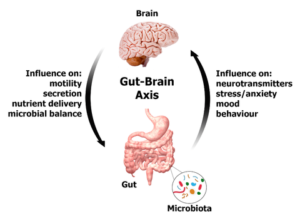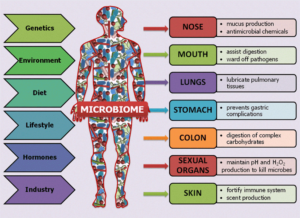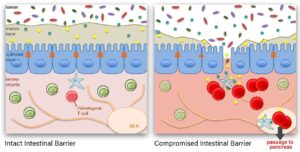In 2018, I started studying more about gut health and how important our microbiome is to our overall health. And here’s what I learned.
You may have heard the quote by Hippocrates that “All disease begin in the gut.” The latest research can affirm that at least 90% of all modern health problems and diseases find their beginning in the gut.
Microbial imbalance (dysbiosis) is the root cause of inflammation and I was shocked that it can lead to so many symptoms, such as anxiety, depression, skin issues, acne, food sensitivities, weight gain, asthma, diabetes, liver disease, cardiovascular disease, IBS, MS, RA, Celiac, Lupus, Hashimoto’s, Fybromyalgia, Parkinson’s, Crohn’s disease, and Alzheimer’s disease/dementia.


The most vital part of your gastrointestinal (GI) health is your gut bacterial community, also known as your microbiome. The microbiome forms a living layer over your skin and parts of the inside of your body, including the lungs and the digestive tract, from your mouth down to your colon. According to the Human Microbiome Project, around ten trillion bacteria live in your body, while you have only one trillion human cells. Your microbiome makes up who you are. You are more bacteria than human, and your health heavily depends on the health of your gut.

Have you heard the saying, “Follow your gut”? Have you ever had a “gut-wrenching” experience? Have you ever felt “butterflies” in your stomach? Well, there’s a brain-gut connection. The GI tract is sensitive to emotion. Anger, anxiety, sadness, elation – all of these feelings (and others) can trigger symptoms in the gut. The brain has a direct effect on the stomach and intestines. For example, the thought of eating can release the stomach’s juices before food gets there. This connection goes both ways. A troubled intestine can send signals to the brain, just as a troubled brain can send signals to the gut. Therefore, a person’s stomach or intestinal distress can be the cause or the product of anxiety, stress, or depression. That’s because the brain and the GI system are intimately connected.
And have you heard of the term “leaky gut?” It’s exactly what it sounds like, and it’s not good! Here’s a basic explanation. The lining of your intestines form the gut barrier, that has multiple ‘gates’ that open and close, to allow small vital nutrients to pass through into the bloodstream, while staying small enough to ensure that larger and potentially dangerous particles don’t “leak” through. When the gut barrier is compromised, it results in what is called ‘leaky gut’. In a leaky gut, toxins, pathogens, and even food particles leak into the bloodstream, and triggers an immune response. So if the gut continues to be ‘leaky’, the immune system has to be on constant attack, leading to continuous and body-wide inflammation.

Bacteria is vital for our survival. These “good bacteria” are integral for boosting our immune system, protecting against pathogens, maintaining healthy digestion, keeping our hormone levels balanced, and making sure our brains are healthy. And these bacteria protect the gut barrier, and work to ensure the cell wall junctions stay tight and healthy, thus preventing leaky gut.
What can cause a leaky gut? Genetically Modified Organisms (GMO food), glyphosate in pesticide is an antibiotic (and causes gut imbalance), gluten stimulates the release of Zonulin, which causes the gut wall to open, milk & dairy products, low intake of fiber, excessive alcohol, environmental toxins, antibiotics, stress, insufficient sleep, and obesity.
You probably have heard, “You are what you eat.” Well, it’s more accurate to say, “You are what you feed your microbes. Your nutritional intake influences the community of microbes living in your gut. What you eat can rapidly change the gut microbiota composition and adjust the major categories of bacteria in the gut. So if you feed your microbes with healthy unprocessed food, you become healthy. If you feed your microbes with junk/processed food, then you become or feel like “junk.”

Here are Ways to Balance Your Gut, also called Metabolic Reprogramming
- Increase the diversity in your gut.
- Increase the diversity in your diet – eat a variety of different vegetables and fruit
- Eat fermented food – sauerkraut, pickles, tempeh, miso, natto, kimchi, apple cider vinegar, etc.
- Go outside in nature – take hikes, go to the beach, etc.
- Intermittent fasting – don’t eat for 12-16 hours (ideally 16 hours). This resets the metabolic response to food. This can be 8pm at night to 12n the next morning. You can start with an 8 hour fast and work your way up, by adding 30 minute increments.
- Get a dog – exposes you to different bacteria from outside
- Increase Akkermansia, which is a beneficial gut bacteria that strengthens your gut lining
- Intermittent fasting increases akkermansia
- Akkermansia loves polyphenols – red wine, dark chocolate (at least 70%)
- brightly colored produce – beets, berries, grapes

- Increase Short Chain Fatty Acids (SCFA)
- Eat garlic, onion, asparagus, leeks, apples, apricots, carrots, oranges
- Eat resistant starches – cold rice, sweet potato, legumes, green bananas, roots, tubers, cassava, yucca, etc.
- Eat mainly nutrient-rich whole plants.
- Minimize processed food, and avoid sugar, honey, syrup, agave – kills the good bacteria in your gut.
- Avoid antiobiotics for non-serious infections. Overuse of antibiotics can have the unintended consequence of reducing or removing bacteria that are important for gut health, as well as increasing the abundance of antibacterial resistance genes. It can take at least 1 – 2 months for most bacterial groups to recover to pre-antibiotic levels. However, even after 2 – 4 years, some bacterial groups do not recover completely.
Additional Tips
- 10-20 minutes of mild resistance-training exercise before meals will decrease the toxicity meals for people with a leaky gut
- Who we surround ourselves with will affect our microbiome, so surround yourself with health-conscious people.
- After eating a non-healthy meal, get back to eating healthy and drink a detox tea.
Ever since I learned all this, I started to be more conscious of increasing the diversity of plants in my diet, trying to eat fermented food and brightly colored food daily. I even started intermittent fasting, not eating from 8pm to 12n the next day. And I try to eat garlic, onions, and resistant starches more often. I have no digestive issues, and I have a strong immune system.
Sources: Dr. Pedram Shojai, Dr. Will Bulsiewicz, Capio Media Pty Ltd, , Dr. Kiran Krishnan, Dr. Eric Zielinksi, Naveen Jain/Viome,
